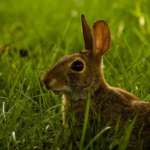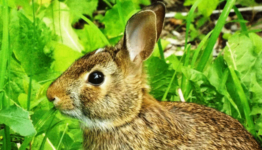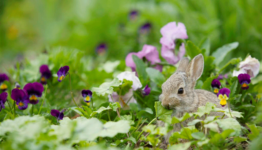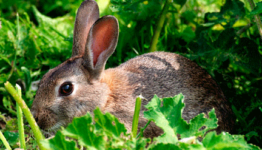The best natural rabbit repellent to keep hungry rabbits away from one’s carefully tended garden are, obviously, walls or fences, unless, of course, a rabbit burrow exists within your property already. If you can find a burrow, pull the grass and foliage all around to make it less hospitable. An owl decoy can be placed by it as well. The rabbits will soon leave to find a better home. Any overgrown areas with long grass are attractive places to rabbit, so plants should be trimmed, and areas under steps and  crawlspaces should be blocked.
crawlspaces should be blocked.
Some home owners wish to completely avoid using chemicals on food plants, around pets, in areas where children play, or as part of a natural and earth friendly lifestyle. With a rabbit problem, chemicals are not most effective repellent anyway. The all natural repellents are also the most effective, and so environmentally conscious gardeners also have the best repellents available to them.
Scare tactics work well for these timid creatures. Domestic pets can be a wonderful help, especially terrier or hunting dogs who guarding their territory, and love to chase squirrels and rabbits. Even cats have been known to hunt and kill rabbits. And if you own a house cat, you can use its soiled litter in the garden. Rabbits will smell predator urine and avoid the area.
Motion detecting sprinklers are able to protect one thousand square feet of garden. Rabbits will hop away when the water turns on and sprays them. Sprinklers will also deter other animals like deer and cats.
The best natural rabbits repellent, however, is an simple mix of eggs (either raw or cooked) and water. One raw egg, or diced egg solid, can be stirred well with one gallon of water to result in a natural and very effective rabbit repellent. Although this mixture is perfectly save for the plants, gardeners raising vegetable and fruit may want to avoid spraying the mixture onto the edible parts of the food plants. A mixture of dish soap and water, while slightly less effective, is also a plant safe rabbit repellent, and it does not have the same potential egg and water to harbor bacteria.
The egg mixture needs to be reapplied frequently and if it seems to be sliding off of the leaves, a little bit of oil can be added to the mixture. Any kind of oil, from vegetable oil to mint oil, will work. Finally, once the solution dries on the leaves of the plants, the odor is not noticeable to humans, but rabbits, and other animals like deer, will continue to avoid eating the leaves.
Whatever version of the egg and water mixture is used, there is no argument that those two ingredients make the best natural rabbit repellent.











